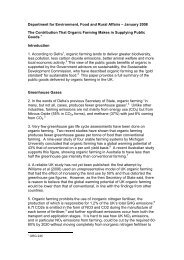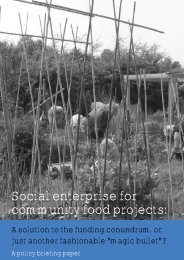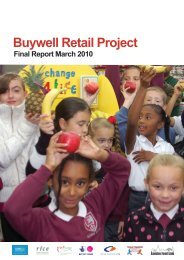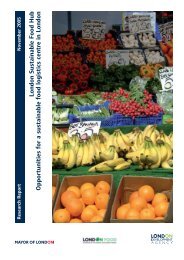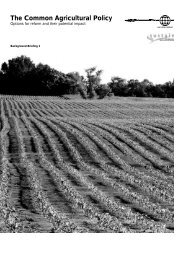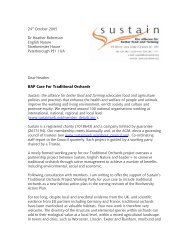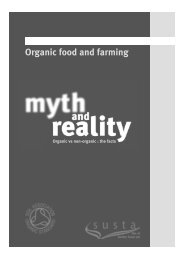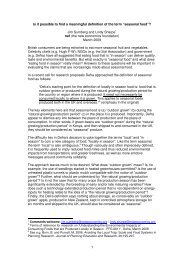Good Food for Camden - Sustain
Good Food for Camden - Sustain
Good Food for Camden - Sustain
Create successful ePaper yourself
Turn your PDF publications into a flip-book with our unique Google optimized e-Paper software.
<strong>Good</strong> <strong>Food</strong> FOr <strong>Camden</strong>3. <strong>Food</strong> and educationEducation from an early age is a critical factor in helping<strong>Camden</strong>’s residents to better understand health in<strong>for</strong>mation andmake healthier food choices <strong>for</strong> themselves and their families.In addition, an increased availability of <strong>Good</strong> <strong>Food</strong> training,integrated into adult education and targeted at businesses,enterprises and the wider community will be key to achievingthe overarching aims within this strategy.<strong>Camden</strong>’s Children and Young People’s Plan (CYPP) contains apriority commitment to promote healthy eating and physicalactivity through a series of action areas. These includeachievement of healthy schools status and reduction of obesitythrough a range of activities. Implementation of the food andeducation theme of the <strong>Good</strong> <strong>Food</strong> <strong>for</strong> <strong>Camden</strong> strategy will becited as an integral element of the plan when it is revised at theend of 2009.Training also has great potential to empower people workingwith food with the skills to prepare, serve and promote food thatis healthy, sustainable and tasty. Training was also a key themethat emerged throughout the public consultation on the strategy,with individuals and organisations requesting training andsupport across all themes of <strong>Good</strong> <strong>Food</strong>.Objectives:■■■■■■ensure <strong>Good</strong> <strong>Food</strong> is integrated into <strong>Camden</strong> extended servicescore offerensure <strong>Good</strong> <strong>Food</strong> is integrated the curriculum and educationstrategiesensure <strong>Good</strong> <strong>Food</strong> is integrated into adult skills training and targetedtraining <strong>for</strong> businesses, enterprises and the wider community.Case study 3: Edible garden at Haverstock SchoolHaverstock School in Chalk Farm has developed a food growing project onsite that all 200 of the year seven students can access and activelyparticipate in. The edible garden was initially built in the summer of 2008 bya group of students, who were at risk of permanent exclusion, and GlobalGeneration, a local charity with extensive horticultural expertise. Usingfunding from NHS <strong>Camden</strong> via the <strong>Good</strong> <strong>Food</strong> <strong>for</strong> <strong>Camden</strong> programme, thegarden is now complete. It is managed by year seven students with the aimof engaging younger students in the food growing activities.The garden is planted with spring and summer vegetables and thestudents take part in a Local <strong>Food</strong> Enterprise programme, organised byGlobal Generation. The produce grown in the school is sold to partneringKings Cross restaurants such as Konstam and Acorn House, who arekeen to increase the amount of locally-sourced ingredients on their menu.For more in<strong>for</strong>mation please contact Sunil Collett, Head of Geography atHaverstock School, Sunil.Collett@haverstock.camden.sch.uk, 0207 2670975; Jane Riddi<strong>for</strong>d, Executive Director, Global Generation,jane@globalgeneration.org.uk, 0207 284 1054.19



